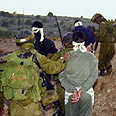
How Israel defeated terror
Special: 10 years after Defensive Shield op, then-DM Ben Eliezer talks about war on terror
In March 2002 a total of 132 Israeli soldiers and civilians were killed in terror attacks and gunfire incidents. On March 2nd, a bomb exploded near a yeshiva in the Beit Yisrael neighborhood in central Jerusalem, killing 11; on March 3rd, a terrorist opened fire at an IDF checkpoint near Ofra, killing 10; on March 10th, a suicide terrorist blew himself up at Jerusalem's Café Moment, killing 11; on March 20th, a suicide terrorist blew himself up on bus route 823 near Um El Fahm junction, killing 7; on March 27th, a suicide terrorist blew himself up in Hotel Park in Netanya on the eve of the seder, killing 30; on March 30th, a suicide terrorist blew himself up in the Matza restaurant in Haifa, killing 16. And these are just the highlights.
“These were difficult days,” says Benjamin Ben Eliezer, who was defense minister during Operation Defensive Shield. “They were bad and difficult days, the operation began at the end of March 2002, but already from the beginning of the month it was clear it was not possible to go on like this. The extent of the terror attacks was intolerable. More than anything else I remember the stream of memos, my military secretary’s sour face as he hands the memos to me, one after another, time after time after time. ‘Suicide terrorist blew himself up in a shopping mall, five killed, 10 injured.’ And an hour later another memo: ‘Fatality toll rose to eight’. ‘Suicide terrorist on a bus’, suicide terrorist in Tel Aviv, in a café in the city center,’ another suicide terrorist, another bus blown up."
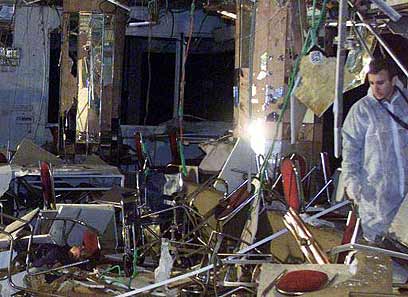
Aftermath of Park Hotel blast (Photo: Reuters)
“So many atrocities. And every time I would leave the office and cross the street, people would come up to me, wanting to know how much longer it would be like this and why we don’t put an end to it. What could I do? Stand on the sidewalk and explain to everyone that we are fighting a war to the bitter end with them? That the Shin Beit is operating inside their territory, that the pilotless drones are hovering overhead, that I am sending the IAF out on missions, and the special forces, and there are eliminations and pinpoint assassinations? What else could be done?"
'They called it Black March'
“Day blended into night for me," Ben Eliezer says. "They called it Black March. Dozens of soldiers and civilians killed beyond the Green Line, 11 terror attacks inside the Green Line, and all this before the attack in the Park Hotel in Netanya.
Even if I came home at 1:00 am, there was a good chance that within an hour or two the phone would wake me – soldiers wounded, civilians shot while driving on the highway… We discovered cooperation between Hamas, Islamic Jihad, and the Tanzim, the Fatah military division, that we did not know about before – and the feeling was that the entire Arab public is convinced this is the way, that only so is it possible to prevail over the Israeli government, to force it to agree to their demands. The worst thing was that our ally Arafat not only did not prevent these terror attacks – he was firmly behind them, pushing and encouraging this deadly activity. He sat in his office in the Mukataa in Ramallah while our country is shedding blood without end. If not day after day, then almost day after day."
Ben Eliezer spent the seder night of 5762, on March 27th 2002, with a paratroop battalion stationed over the Green Line. He took his wife Dolly and the children and traveled with them up to the Mt. Gilo Study Center, above Beit Sahur. There was a cold wind outside, freezing, and inside white table cloths on the tables. No sign whatsoever of the coming atrocity.
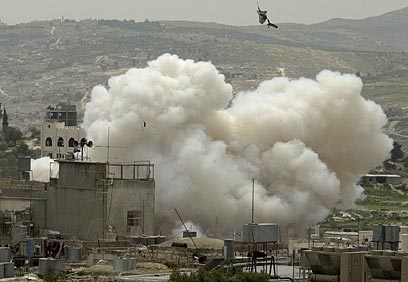
IDF opertion in Bethlehem in 2002. (Photo: AP)
“We had not finished reading four pages in the Haggada,” he says, “and already the first news arrived: Terror attack in the Park Hotel in Netanya, there are killed and wounded.” The numbers came much later: 30 killed, around 170 wounded.
Ben Eliezer was upset. “Dear friends,” he said, “there is a terror attack, I have to leave.” He went out with the commanding general, brigade commander and battalion commander and told them that this time it will not pass silently, that it is not possible that people who come to celebrate the seder walk away from it all torn to pieces and covered in black dust.
“I sent Dolly and the children home and flew to my office in the Kirya in Tel Aviv, where I met – still dressed in holiday clothes from their own seders – Prime Minister Ariel Sharon, Chief of Staff Shaul Mofaz, and some generals from army headquarters. It was clear to all of us that this was a turning point, that there is no alternative. We made a dramatic decision – to enter Territory A. You must understand that until then, almost 10 years passed since the Oslo Accords, and we did not enter these territories. There was a general agreement and we concurred that by the end of the holiday the army would present a plan for approval, and so it was.”
'We changed the rules'
But the decision had to pass through the cabinet, “and there” says Ben Eliezer, “there were other voices – ‘we don’t need this’, ‘it is dangerous’, 'the risks are greater than the benefits'”
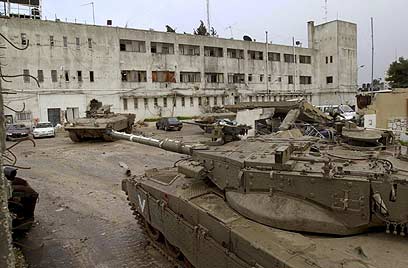
Tanks closing in on Mukataa building in Ramallah (Photo: AP)
“I don’t really remember who was opposed, but what is important is that the decision passed, and today, in retrospect, I am positive it was there we caused the big change. We changed the rules completely. We reached a point where we are not afraid of going into the refugee camps but they will be scared to death of us. They understood during the operation and after that they had no place of refuge, no one to protect them, and that there is no operation that Israel cannot undertake if it decides to do so. Until today there is a debate if this operation stopped the terrorism or the separation fence did this. I say, without diminishing the importance of the fence, it was a product of the operation. No fence can stop the terror attacks if there is no advance operation of the sort we undertook there."
“Already in 1996, after the bad terror attacks that came mainly out of Gaza – we had experience with operations. We laid ambushes in the field, the commandos operated inside, but this time it was clear, and so it was defined, that we had to do something different. That the methods we were employing until then had not proven themselves. This operation changed the history of the relationship (with the Palestinians).”
According to Ben Eliezer, the terror attack in the Park Hotel was the turning point. “This was a tsunami,” he says. “The evening meeting was short, the army was sent to do its homework, and the biggest concern related to the decision to enter the refugee camp in Jenin. Jenin was an example and a symbol – the place from which a large portion of the worst attacks emanated. It was clear to me that entering the refugee camp is the most significant thing: this means penetrating their stronghold and striking not only at the terrorists’ capabilities but also undermining their motivation.”
Praise for Sharon, Mofaz
In retrospect, Ben Eliezer describes the events of that period like walking a tightrope – between the desire to strike the terrorists and stop the madness of the attacks, and a desire not to terminate the Palestinian Authority and the effort to reach a situation in which it would be a partner in the struggle.
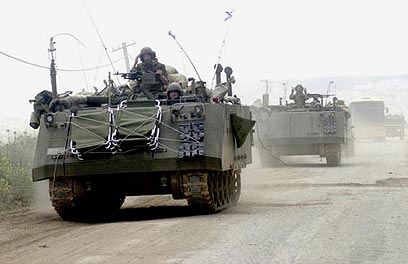
IDF leaving Jenin following operation (Photo: GPO)
“Sharon wanted to demolish the Mukataa immediately,” he says, “just eradicate it. I was against that. I agreed about taking down the buildings to the left and right of it but said we should leave the part in which Arafat is located. My reasoning was that we should employ an iron fist against the terrorists but not harm the symbols of the Palestinian people, and the Mukata was such a symbol.”
“There were a number of factors that led to the successful outcome of Defensive Shield. Firstly, the army was prepared. We did not start to plan this war on the night after the explosion in Netanya. Months before we were talking about the need to be prepared for this possibility. I thought we needed to do this, but the army hesitated. Dan Harel, who was then head of the operations wing, assessed that on entering we would have around 100 casualties. In fact, Defensive Shield was the end of a long process that moved from crisis to crisis in an effort to find a path, political or military, including broad operations by the Shin Beit in the field.
"The establishment was ready and able to face any scenario, including breaking the taboo and entering Territory A. There was also full understanding and cooperation within the triangle – Sharon, Mofaz and I – a prime minister who is a military man, a professional chief of staff, and a minister who served twice in the West Bank and knows the territory and the people involved. By the way, Sharon and Mofaz are both men who know how to make decisions…Following the operation, there was mainly great relief a feeling we did something that changed the rules.”
- Receive Ynetnews updates directly to your desktop










